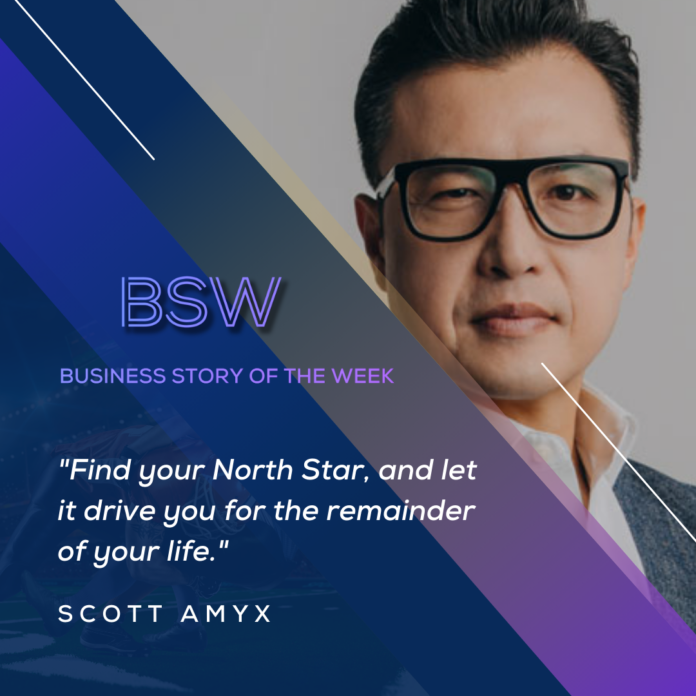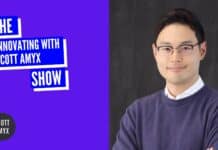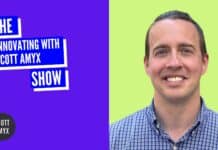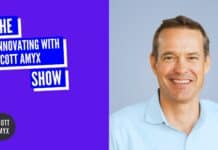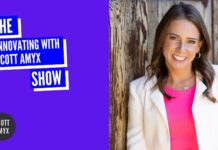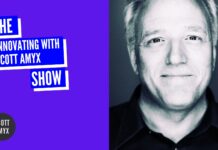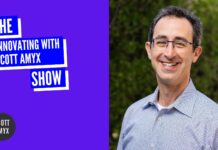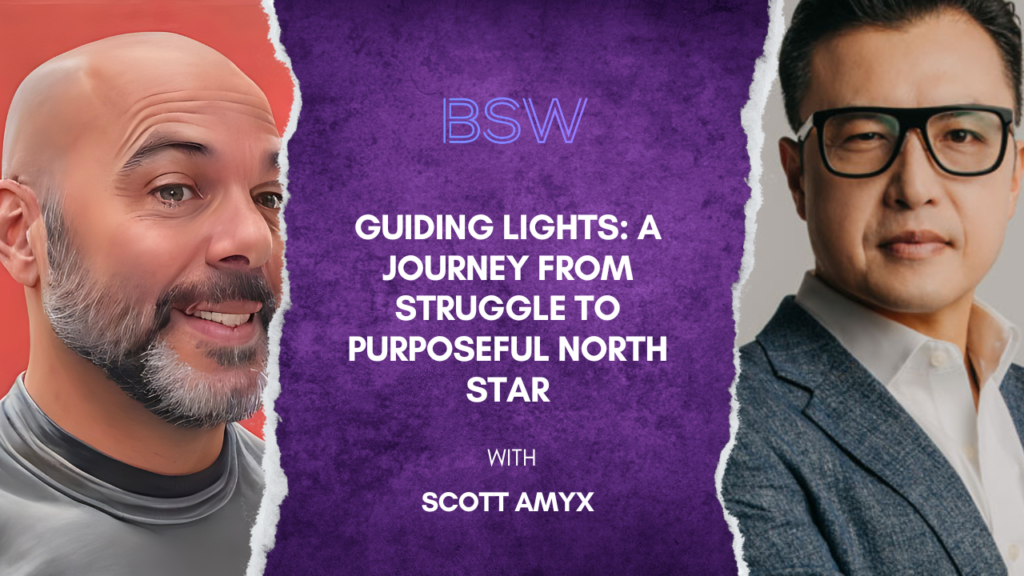


Scott Amyx was recently interviewed on Business Story of the Week.
Listen to the podcast interview below.
Interview transcript:
All right, welcome to another special episode of Business Story of the Week. Today we are excited to introduce Scott Amex. He’s the managing partner at Astor Perkins and a luminary in deep tech and sustainability. Scott is a TEDx speaker and Forbes New York Business Council member. Scott celebrated for his innovative insights in smart cities and the
Amongst other things, his work extends from tackling global challenges like climate change to advancing human survival in space. Scott’s dynamic keynote speeches are renowned for being practical, engaging, and their approach that inspires profound innovation and challenges conventional thinking. He had a 2017 TED Talk called Strive. How to do the things most uncomfortable.
leads to success. He received a standing ovation and this really highlights his impact and the impactful message on and this is something we talk about a lot on the show on embracing discomfort. He is a recipient of numerous accolades. He’s been voted top global keynote innovation speaker and his influences span across international conferences and Fortune 500 companies.
and we’re really excited to welcome Scott to the show today. Scott, welcome as a visionary who is shaping the future of technology and sustainability. Tell us a little bit about you and what you do.
Scott Amyx (01:45.878)
Well, first of all, it’s a pleasure. Thank you for having me. I appreciate it. Well, let me start with a story. About 15 years ago, I spoke at a Silicon Valley conference on technology. The moderator who introduced me, much like what you did, read a long list of accomplishments. And I heard him kind of comment to himself, how on earth did this young man accomplish so much when he’s so young?
A couple of things, one is I did accomplish a lot. But the other secret is that I’m not as young as people perceive me to be. The topic that I wanna share with your audience, and this is something that I have accumulated over the course of over 50 years of life, is this simple, very simple wisdom, which is striving without a North Star is pointless. So let me just pause there to see if you have any questions so far.
(02:43.854)
Yeah, so tell us a little bit more about that, right? It’s very interesting, you know, Napoleon Hill in his book, Think and Grow Rich, talks about how the majority of men are rudderless ships swimming through the ocean, right? They’ve got no direction, no North Star, as you say, no focus on where their life is going, right? And you obviously, you’re a partner, a senior partner in a very successful venture firm.
You’ve made your money. How would you suggest that somebody who’s just starting out or somebody who hasn’t reached your level of success find a north star? How could someone looks at you and they go, man, look at this guy. He’s living a great life. He’s succeeded, right? And of course, when people say that, they don’t see all the struggle that you had to go through. They just see you pulling out of the Ferrari, going into the nice restaurant.
you know, with the $100,000 watch and, you know, I mean, I don’t know if you have those trappings of success, but they see that and in our minds, in our monkey minds, we somehow tend to think that, oh, that person got that easily. Like, that’s what they got it for. So how would you recommend somebody who’s just starting out or somebody who hasn’t reached your level of success to approach that?
Scott Amyx (04:09.35)
I’m glad that you actually set this up properly. So I’m going to actually peel the onion and show you behind the curtain. So let me give you a little bit of backdrop. And this is going to help because I think the listener is going to connect on a more humanistic level. So I grew up poor, incredibly poor in South Korea. And my mom’s side of the family was very much against my mother marrying
Scott Amyx (04:40.47)
Now on the wedding day, my dad was wearing a white tuxedo, which was kind of the fashion back in the 60s, I suppose. But he was beaten up by my five uncles. And his white suit was completely covered in blood, foreshadowing of what was to come. Now after just a few years of a rocky marriage, my mom asked him to leave. Now the issue is back in the 1970s when I was growing up in South Korea,
Not having a father meant that people, including my own relatives, would treat me like a bastard, an illegitimate child. Now, without going into the years of abuse from my relatives, both in South Korea and eventually in the United States when we immigrated, one day I found myself very much alone, completely abandoned.
My mother at that time was hospitalized due to significant neglect and abuse by her brothers. And I found myself taken from my elementary school class to the police station, and that same very night to an emergency foster home for juvenile boys.
From the age of 13 or 14, I became a ward of the court, and I stayed in foster care until I became an adult.
Now, of course, no, this is actually now in America. I’m intentionally omitting a lot of details, but when someone goes through trauma, significant trauma, there are at least two paths that present itself. The one that I saw all around me when I was growing up was the most common. Most of the foster kids that I knew were incarcerated, or worse, they were killed.
Scott Amyx (06:37.25)
they became victims of their circumstances.
Scott Amyx (06:45.922)
I love the way you set this up because I think for many of your listeners, sometimes they feel that life has dealt them the wrong set of cards. And they feel demotivated. They feel even defeated. Why bother to try when life is against you, right?
Well, I happened to take the other path. I was going to rise from the ashes like a phoenix and show my relatives that I was worth something.
Scott Amyx (07:16.942)
When I came to America, I didn’t speak a word of English, but yet within a year, I started to accumulate stack of awards and recognitions at school.
And I’ve always been success-oriented. You read off a short list, but I’m a national Sloan Fellow. I started at Carnegie Mellon. I obtained my master’s at the University of Chicago with the intention of obtaining my PhD in economics. I worked at the Federal Reserve Bank of Chicago. I was a pioneer in fintech back in 2008, before there was even a category called fintech. And I increased our startup sales by 10x.
and help it be acquired by a Fortune 500 financial services company. And like you read, I’ve been covered in Time Magazine, Forbes, Washington Post, Wire Magazine, TechCrunch, Pew Research, Chicago Tribune, and Forrester, and I have spoken all around the globe as a futurist and a deep tech venture capitalist.
(08:21.21)
Yeah, so let’s bring it back to trauma leading to success. I’ve got lots of friends that are Korean. I’m Iranian, we also came here, same story. We came here as immigrants, poor. And I left home at a very young age. So similarly, I understand the benefits of trauma. I know it sounds odd, but I tell that to a lot of people that you can use that struggle.
either to elevate you and to elevate where you’re going, or you can go the other direction, right? There’s really only two directions. And most of the entrepreneurs I know that have made something from nothing, that have created fortunes from nothing, have had some type of struggle that they’d had to overcome. And when they look at it, yeah, nobody wants those terrible things to happen to them.
but they see them as a part of their path. And something I hear more often than not that just blows my mind is when asked, almost all of them say, I wouldn’t trade that for anything. I wouldn’t trade having the difficult times and the abuse and whatever that was. And when I say why, they say, because it makes me into who I am today. So I can see with you that those difficult experiences while
they may have beat you down for a while, you managed to rise above them and reach to the heights of society, which again, I think a lot of people that are watching this and listening to this aspire to. So let’s reel it in to the first million bucks that you made, right? Because I think that’s kind of a marker. I mean, I don’t know, I’m 48. How old are you now, Scott?
Scott Amyx (10:14.102)
I’m in my 50s, but I want to actually talk about a nuance which I think is kind of being glossed over, which is we are who we are based on what we call character development and the ups and downs that we go through as part of human conditions makes us who we are. And every one of those experiences, whether it’s pleasant or not, develops that perseverance, that grit, that resolve. But the nuance that I want to get into…
which I think is different because again, I’ve always been driven and there are people that are driven but driven for the wrong reason. So what I’m saying is I was missing something and that missing something was my North Star. You see, I was chasing a ghost. I remember in my 30s, my counselor asked me a question which was, why are you so driven? He asked me, who are you doing it for? I said them.
And the more he probed, I can’t give good answers. I said, well, they’re faceless. They’re nameless.
For me, personally, I learned at an early age that my relatives…
was kind of the catalyst, right? They mistreated me, they abused me. And I learned that people, because in my little world as a child, my uncles, my aunts represented people, and that people will hate you. They will treat you ill. They will remind you that you’re worthless. So I grew up not trusting people, that people are bad.
Scott Amyx (11:58.422)
What I’m trying to say is that there’s this nuance because again, I don’t want to take a very I don’t want to take this concept and make it right So I was trying to cover up my trauma through success But after achieving something I wasn’t satisfied and I think many of you listeners have this as well, which is You don’t experience contentment So I achieve more and again and again
but it just felt so empty. You know what I mean? It wasn’t until my 40s that I worked with a coach. And she helped me to realize that I needed a North Star that was greater than myself. This is the point of today’s interview. Because it’s not about being just success-oriented because you want to drive a Ferrari or you want to become a millionaire. It’s about the fact that as you mentioned, there’s ample research.
and ample books that show scientifically that individuals and organizations achieve much more in terms of our goals when our goals are greater than ourselves.
Scott Amyx (13:14.474)
Now for me personally, the issue with my North Star in my 40s was that I knew what it was. I knew that it was to help vulnerable people around the world by achieving sustainable economic development. And the way I define that is using technology and innovation to create new industries and jobs so that people can become self-sufficient, have self-dignity, and be in a position to support their families.
But I want to share something that I’ve been struggling for years. And it comes from 1 Corinthians chapter 13 verse 13 in the Bible. And it reads, And now these three remain, faith, hope, and love. But the greatest of these is love.
Scott Amyx (14:10.702)
The problem that I had was that I didn’t love people.
Scott Amyx (14:16.49)
I as a young child was conditioned to distrust people because people always hurt you.
Now coming back to your question a little bit is fast forward, I’m now in my 50s and God has finally turned my head knowledge into my heart knowledge. We’ve started a college fund, my wife and I, for young high school children, or students I should say, that are people of color as well as those come from disadvantaged backgrounds. And this year, yes, we have given four scholarships.
(14:51.014)
You guys have kids?
Scott Amyx (14:57.85)
And I’ve also started to help people that really need help around me that are very in desperate situations. And more recently, I’ve started to help with refugees. Now, these refugees come from some of the worst war-torn countries, and they’ve experienced incredible political, religious, and ethnic oppression. And they frankly have been through hell and back several times. And for those that are listening,
Only 1% of those who apply for refugee status gets approved. It takes a good solid decade process for agencies to vet them rigorously before they get approved.
(15:41.574)
No, I get that. You know, we came here as refugees. Sorry to interrupt you. Go right ahead.
Scott Amyx (15:41.611)
Now.
Scott Amyx (15:46.11)
Yeah, yeah, yeah. So as I pour money, time and love into these people, I find myself from time to time just sporadically swelling up with tears. There’s a very simple story just to give you on the ground. I took this family shopping recently, and the husband seemed to be very infatuated with shoes for some reason I can’t understand it and he was about to buy
three pairs of shoes and put into the basket. Now he eventually restrained himself and only got two pairs. So I had to ask him, I said, those shoes that you’re wearing, the only shoes that you own in your entire life, how long have you had it for? He said, I’ve had it for six years since I escaped my home country. This is my only pair of shoes. And it didn’t, at that time, it didn’t, I didn’t really take that.
Scott Amyx (16:43.706)
anything except I found myself maybe about half an hour driving home just letting that sink in and coming to the realization that his new pair of shoes symbolize something much bigger. It symbolized hope, it symbolized freedom, it symbolized a chance at a new life. And as I drove home that night I was just filled with tears realizing the struggle this man and his family had gone through in the past decade. Which brings me to
not about the first million dollars or the first billion dollars. You have to have a North Star, but you have to ask yourself if you have the right North Star. That’s a very important question. My North Star happens to be helping those that are most needy, that are most vulnerable. So now, kind of juxtaposing what I said in the beginning and now is that when I succeed, when I increase my net worth,
as a business owner, as an investor, it’s not because I’m trying to drive a better car, have a bigger home, or consume more leisure. It’s because I wanna be in a position to help channel more of my time, energy, and resources to help the neediest, the most vulnerable people in my community, my nation, and eventually the world.
(18:12.082)
I love that. That’s so powerful. So I’ve got one question for you and then we can close this out and I’m sure people are gonna wanna learn how to get involved with you. And if you have ways where people can be in touch with you and learn more about your work, but you have kids, right? So you said you’ve got, how many kids do you guys have?
Scott Amyx (18:34.782)
I have two, one in college and one in high school.
(18:37.106)
Okay, so obviously you grew up rough, right? You grew up real rough, right? How do you, and that roughness built grit, it built character, and it led you to be who you are now. Right, an incredibly successful person, your partner in a big firm, you have everything that you want. Your kids,
don’t have that same struggle. How do you get them to be not just good people, but live amazing lives? Because one of the things that you said, which I found very poignant, and we talk about this a lot on the show, is I tell people oftentimes, don’t chase money, don’t chase fame, don’t chase success, chase excellence.
and that other stuff comes as a byproduct of chasing excellence. Just go out there and be the best, but really be the best at what you do. With kids, with our kids, it’s harder, right? Because they’re rich kids. No matter what you do, they’re always gonna be rich kids. So how do you give them that integrity, that grit that you have?
Scott Amyx (20:06.45)
It is an excellent question and I’m glad that you framed it properly because the reality is…
how you live your life to me ultimately gets manifested in the form of your legacy. Your legacy being your kids and your grandkids and subsequent. And for certainly my kids, they have lived a very entitled life. So there is a certain expectation of things to be okay. Right? But with that said, they’ve been raised in such a way that they are driven to be excellent.
But one of the things that I’m trying to teach them as they get older is it’s not excellence because I tell them to be excellent. It’s not excellence because they’re trying to compete in a very hyper competitive market. It’s excellence for a purpose. It’s you focus. It’s others focus. Matter of fact, this week, while they’re on vacation, they’re helping me assist the refugee families because if they don’t understand their purpose in the context of service and
ministry and philanthropy and charity, they’re missing the point. That’s most important. They have to be others focused and they’re in their own journey developing what their North Star is that’s going to drive them for the rest of their lives. They’re in progress. The good news is that they have a tender empathetic heart for people and I’m very thankful for that.
I want to leave your audience with one last story, because I know we’re wrapping up here, is like I said, and you’ve also mentioned it as well, is I’ve traveled the world extensively, speaking as a futurist and as an investor. My third time in Saudi Arabia, I had traveled to Riyadh a few times, spoken at Jeddah at a university. Usually when I travel, a car service picks me up. But by then I feel very comfortable.
Scott Amyx (22:08.002)
going to Saudi Arabia on my own. And I was at the airport and I was looking to see what service I was gonna take to get to my hotel when I see this local Saudi man waving at me to take his taxi. So I thought, you know what, let me give him a chance. Now in the car, he tried to speak to me, but clearly he didn’t speak English, and it was very broken and frankly not comprehensible, but that’s okay. But what I saw next to his dashboard on the side was a picture of his family.
Family of five.
When we arrived at Intercontinental, instead of dropping me off at the front of the resort, he dropped me off at the side of the hotel.
It was very clear at this point that he was not a legitimate taxi driver, not even sure if he was licensed. And more so he proceeded to charge me three times the fare that I knew was going rates, yet I paid without complaint. Why? Because I knew that as a local Saudi, he was stuck in society. The low level jobs were taken up by the Filipinos and North Africans.
and the high level skill jobs were taken up by the Indians and then even higher, the Europeans and the Americans. So he was stuck in this no man land where he needed to feed his family, but how?
Scott Amyx (23:37.042)
And I have compassion for this man. And I have thousands of other stories just like this where regardless of culture, language, how they look, they just only have one goal in life, which is to have dignity, self-respect, and to support their families. Question I would ask your audience is, what is your North Star that’s greater than yourself? And if you find it, let that be your guiding light.
for the remainder of your life.
(24:09.35)
What a great way to end the show. I really appreciate it, Scott. Thank you for being on. If people wanna get a hold of you or learn more about what you’re doing or contribute to one of your causes, is there a way where people can learn more about your work?
Scott Amyx (24:23.726)
The best way to find out about my body of work is to visit my website, scotamix.com.
(24:32.786)
Great, amazing. And we’ll include that in the show notes. Thanks so much for being on. Hang on just a couple of minutes after the show.
Scott Amyx (24:39.148)
pleasure.
Listen to the podcast interview:
Book Scott Today
Book Scott to keynote at your next event!
Managing Partner at Astor Perkins, TEDx, Top Global Innovation Keynote Speaker, Forbes, Singularity University, SXSW, IBM Futurist, Tribeca Disruptor Foundation Fellow, National Sloan Fellow, Wiley Author, TechCrunch, Winner of Innovation Awards.


